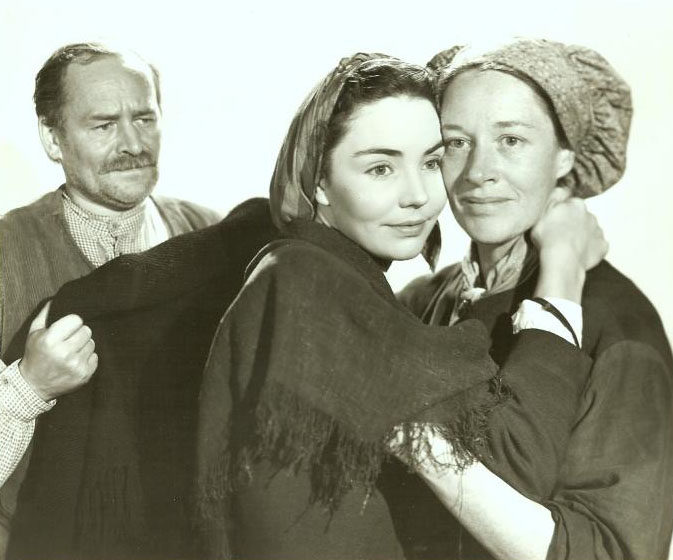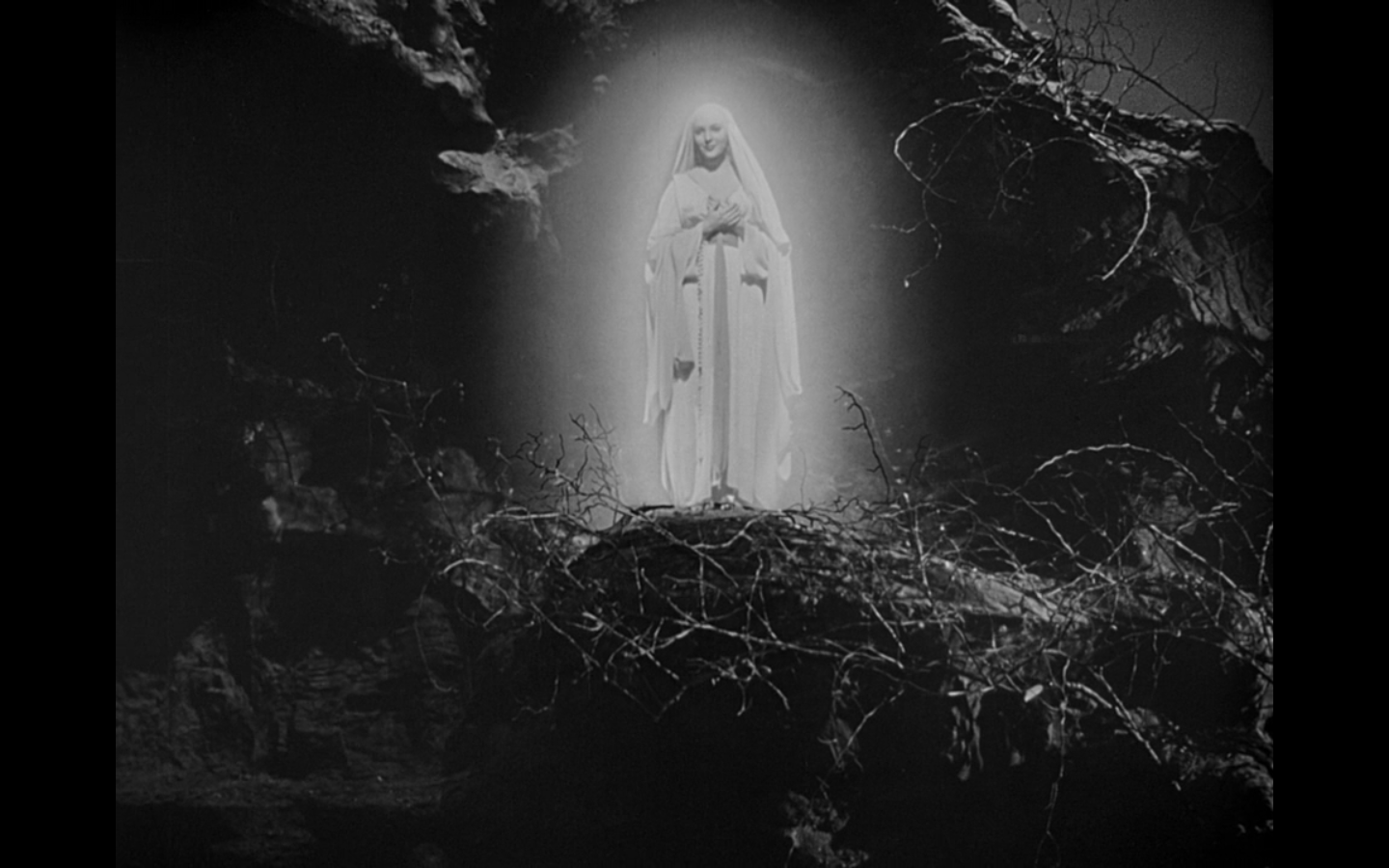The Song of Bernadette is a motion picture directed by Henry King (Twelve O'Clock High) and released in 1943. It is based on the book of the same name by Franz Werfel. The film tells the story of Saint Bernadette Soubirous, played here by Jennifer Jones, who the Blessed Virgin Mary appeared to at Lourdes, France in 1858.
Like the book it is based on, The Song of Bernadette takes certain liberties with the historical truth. The most obvious being the existence of romantic feelings between Bernadette and (her real life friend) Antoine Nicolau as well as the portrayal of the local authorities as being more anti-religious than we know they were. There are other, smaller departures, but for the most part the film follows the actual events fairly accurately.
The real strength of this film is in its complex portrayal of the characters and its exploration of faith, skepticism, and the true meaning of redemptive suffering. All the characters in the film are affected by the apparition in some way. Bernadette's parents are challenged to look past their misery and stand by their daughter through her ordeal. The town authorities are confronted with a situation which ought to engender in them a greater respect for the devout citizens of Lourdes, a challenge which they, large in part, fail. Finally the religious figures, Father Peyramale and Sister Marie Therese Vauzous, both have their own notions about their faith and religious life challenged. Finally Bernadette herself is forced to choose between following the simple, unassuming life she desires and the saintly vocation of suffering and ridicule the Lord calls her too.
The films opens by showing the poor state of Francois Soubirous' family. They are forced to live in a old prison cell and Francois (Roman Bohnen) makes his living doing odd jobs, including the disposal of contaminated bandages from the hospital (which he dumps in the cave at Massiebelle where the apparitions will later take place). His wife Louise (Anne Revere) serves a midwife for their neighbor and also does laundry to earn money. Both are worried about feeding their family and Francois bemoans his state in life. Louise shows much concern for Bernadette's health, as she has asthma. When the apparitions happen, she does not believe Bernadette and forbids her to return to Massiebelle. Both parents are afraid of the ridicule that Bernadette's visions might attach to her, and their family. Bernadette's aunt Bernard (Blanche Yurka) however, supports her and this helps her mother realize that she must do the same no matter what. She accompanies Bernadette to Massabielle. As Bernadette begins to attract devoted followers and is questioned by the police, a still weak and frightened Francois tells them he won't allow her to return to the grotto. But seeing the suffering this causes her, his heart finally melts and he allows to go to the grotto once again, offering her his full support.
When the apparitions begin the authorities in Lourdes are concerned about the negative attention and scandal it will bring to their city. All of them see themselves as being too modern and sophisticated for the simple and "backward" religious beliefs of the people of Lourdes. Dr. Dozous (Lee J. Cobb), whose professional status in the medical field makes him uninclined to give credence to religious phenomena, is convinced at first only of Bernadette's personal sincerity. Later, more gradually, he also begins to believe in the miraculous nature of the cures and, perhaps, the visions themselves. Prosecutor Dutour (Vincent Price), a man of scientific thought and who possesses only contempt for religious sentiment, has an almost opposite kind of character development, becoming increasingly hostile toward Bernadette and her visions. Only near the end of the film, as he faces dying of throat cancer, does he finally experience a desire for conversion exclaiming "pray for me Bernadette".
Sister Marie Therese (Gladys Cooper) is introduced in a scene early in the film, where she teaches her students, including Bernadette, Catechism and emphasizes the necessity of suffering in order to obtain salvation. She scolds Bernadette for being lazy in her studies when she doesn't know what the Holy Trinity is. In reality, Bernadette cannot help it, she missed the class on the Holy Trinity because of her asthma. The pastor, Fr. Peyramale (Charles Bickford), comes in to award the hard working students with holy cards but declines to give one to Bernadette because of her purported negligence. When Bernadette starts seeing the Lady, Fr. Peyramale tries his best to stay out of it at first, not wanting to create scandal for the church should Bernadette's claims prove to be false. He is very skeptical about Bernadette's visions and doesn't find her completely trustworthy. The priest slowly becomes convinced of Bernadette's honesty but remains skeptical about the heavenly origin of her visions. Despite the reported miracles and revelation of the Lady's name ("I am the Immaculate Conception") he remains unconvinced. Only when the Dutour schemes to have her put in a mental institution does he finally step up and begin supporting her, eventually becoming her mentor. Sister Marie Therese is vehemently opposed to accepting Bernadette's claims. She can't understand how someone who has not actively pursued suffering as she herself has could be graced with a vision from heaven. She even ridicules Bernadette in front of her classmates, with Fr. Peyramale permission, in order to dissuade her. She continues to persecute Bernadette after she joins the sisters of charity. It is only years later, after Bernadette contracts tuberculosis of the bone, that Sister Marie Therese realizes the error of her ways and begins to care for Bernadette in her illness.
Bernadette herself is of course, greatly affected by the visions she sees. She wishes only to live a good, ordinary life but because of the visions she feels called to something greater. She has to endure all kinds of persecution and negative attention as a result. When Fr. Payramele urges her to pursue a religious life, instead of becoming a maid servant as she wishes too, Bernadette is at first reluctant, but ultimately decides to follow his advice. As the Lady tells her "I cannot promise to make you happy in this life, only in the next".
The themes about belief and skepticism are dealt with mainly in the scenes involving the Lourdes officials. Dutour cannot believe because his rationalism has hardened his heart, as he says near the end of the film, "Now I know that we are a wretched animal species, distinguished from the insects only by nerve centers". Dozous, on the other hand, has his rationalism tempered somewhat by the natural compassion he has for his patients. This leads him to more readily accept the miraculous cures. The scenes with Father Payramele serve as a nice counter to these, showing that reason and faith are not opposed. Unlike the officials he is not an atheist, yet he still struggles to accept the Lady's words "I am the Immaculate Conception". How can someone be conception? Yet he is ultimately able to accept that Bernadette's Lady is indeed the Blessed Virgin. This demonstrates how many believers and non-believers grapple with certain questions until the day they die, and ultimately we must all rely on faith. The film's themes about suffering are dealt with mainly through Sister Marie Therese's character. She believes we should actively pursue a life of suffering, but on seeing how much Bernadette has suffered, and indeed how much suffering she herself has given Bernadette, she realizes the true meaning of suffering. For the most part, God does not want us to force suffering on ourselves but instead to humbly accept the sufferings he gives us without complaint, as Bernadette did. Bernadette's parents also learn to accept the suffering and persecution that comes with supporting her. Finally, through Dutour's story arc we can see how God can use suffering to bring the lost sheep back into the fold.
The film is very well acted with Jeniffer Jones putting in a solid lead performance as the simplistic and charming titular saint (one which won her an Oscar). The supporting cast do a good job as well, particularly Vincent Price, who's portrayal of Dutour adds a cynical kind of humor to the proceedings, and Lee J. Cobb, who is quite good at Dr. Dozous. Henry King's direction is effective as is Alfred Newmans's Oscar winning score, though the latter is not without it's occasional distracting bombast. With that said, the film is not without other flaws. With so many characters to deal with, Bernadette sometimes feels lost in the shuffle and the film feels somewhat fragmented at times. Nevertheless, The Song is Bernadette remains a well made historical drama, containing strong characters and complex thematic elements.
Score: 9/10





